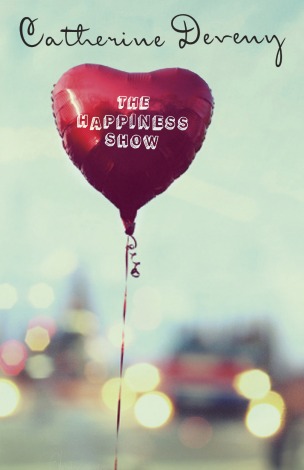The Happiness Show, by Catherine Deveny. Penguin, 2012. Website
Jen
 Unconventional, controversial and caustic, Catherine Deveny has also garnered a few names not fit to print. You can rely on the writer and comedian to shoot first and ask questions later, a quirk of nature she's paid for dearly on numerous occasions, most notably her infamous sacking as columnist from The Age after a series of bad-taste tweets including one about the then 11-year-old Bindi Irwin.
Unconventional, controversial and caustic, Catherine Deveny has also garnered a few names not fit to print. You can rely on the writer and comedian to shoot first and ask questions later, a quirk of nature she's paid for dearly on numerous occasions, most notably her infamous sacking as columnist from The Age after a series of bad-taste tweets including one about the then 11-year-old Bindi Irwin.
In The Happiness Show (which was initially released in 2012 and is released as a reprint this month) Deveny tries her hand at something much safer — fiction — turning her comic timing and irascible eye to that 21st century preoccupation of ours: happiness.
The novel introduces us to 38-year-old Lizzie Quealy, a comedian, writer and mother of two living a close to bona fide bohemian life in inner-city Melbourne.
With a loving and supportive partner, great job and smart-talking bestie, it seems, to all intents and purposes, that Lizzie has this happiness thing pegged. That is until a business deal takes her to London, her former stomping ground, and a chance meeting puts her in contact with Tom, an old flame from her 20s.
It soon becomes apparent to Lizzie that it wouldn't take much to reawaken that 'spark' the two shared more than a decade ago. Tom's her 'what could have been', and, once back in Melbourne, Lizzie begins a dangerous game of long-distance flirtation.
Deveny and Lizzy seem to share many characteristics (both are comedians, live in Melbourne, are curvy, and adroit at the witty put-down); so many in fact, that at some stage I gave up thinking of Lizzie as a separate character. Thanks to an overly generous sprinkling of sex scenes, this quickly went from mildly disconcerting to downright awkward. I'm not sure if Deveny is simply writing to the 'chick lit' brief, but for me it was a case of way too much information.
Deveny also lays on the colloquialism a bit thick. During the scenes in London, it's as if Lizzy has caught a bad case of the 'Strewths'. Seriously, who, aside from Home and Away's Alf Stewart, exclaims: 'Fair suck of the sav?'
I enjoyed, and could relate to, the book's central premise: that trying to pin down the bubble of happiness is as absurd as it is counter-productive. But what I admired about Deveny's columns, and what I find lacking here, is a candid, pared back, take-me-as-I-am honesty. It's her first novel, and she's still finding her feet, but unless you're an unabashed fan, Deveny's overly colloquial and, at times, abrasive voice might well grate.
What's your take, Barry?
Barry
Of the 12 books we've discussed this year, The Happiness Show is easily the most self-indulgent.
Emerging sporadically between tacky love motifs, tragic grace notes and the tenuous links between plot plausibility and authorial wish fulfillment, Deveny's Lizzie does have her likeable and resonating moments. And Deveney her apt Richard Curtis references, which she renders with something akin to understatement.
As for the novel's booty-calling — a sliding scale from disconcerting to awkward? You said it, Jen. Take the ballad of Lizzie and Tom's emailed hanky panky; not so much erotica as e-nausea: 'I dreamt the other night that we were in this place ... You pulled me into this empty room and we started kissing. Just kissing. I woke up and I had come ... I lay you back on your pillow ... breathing in the earthy, sexy muskiness ...'
And Deveney's cultural exaggerations? Well, yes again, Jen. There are some solid (albeit Ockerised) depictions of who Australians purport to be, but the local lexicon as captured by her seems to be solidly stuck in a nostalgic setting, circa 1983.
There are, though, some genuine efforts on Deveny's part to wrestle with that old moral chestnut: is there harm in gettin' some lovin' on the side if no-one's the wiser? Is it only fear and the damage done during and after affairs that prompts inaction?
The author puts the prosecution's case (describing a minor character's blues) in the voice of Felicity, Lizzie's long lost love Tom's stalwart missus: 'They had the perfect life. All he had to do was keep it in his pants and they would have lived happily ever after. Why would you risk it?'
For Lizzie, however, 'settling' and moderation do not equate with happiness.
I'm a lover of satirical marauders, and Deveny has made a career out of bungee jumping between the chasms of good taste, good writing and good sense. She's never been content to accept societal hypocrisy, and that's an occasional strength herein.
There is also an understandable, laudable rejection of judgment that strikes a blow for the pent lovers of every nation and age: 'Lizzie wasn't thinking about her kids, about Jim, about anything. This was involuntary. It was not negotiable. It was something she had to do ... there seemed to be no past and no present. Just them. Just now.'
I know and recognise the half-formed caricatures that are Lizzie's freeze-dried brothers and her passive co-parent, Jim. If Deveny had blended the milk of human kindness with the liqueur of passion, however, she may have come closer to the curdled human reality that comes from wrangling the best of both worlds.
Perhaps Jen, authorial misdirection and indulgence are what best pass for honesty.
 Jen Vuk is a freelance writer and editor whose work has appeared in The Herald Sun, The Sydney Morning Herald, The Australian, The Age and The Good Weekend. Barry Gittins is a communication and research consultant for the Salvation Army who has written for Inside History, Crosslight, The Transit Lounge, Changing Attitude Australia and The Rubicon.
Jen Vuk is a freelance writer and editor whose work has appeared in The Herald Sun, The Sydney Morning Herald, The Australian, The Age and The Good Weekend. Barry Gittins is a communication and research consultant for the Salvation Army who has written for Inside History, Crosslight, The Transit Lounge, Changing Attitude Australia and The Rubicon.